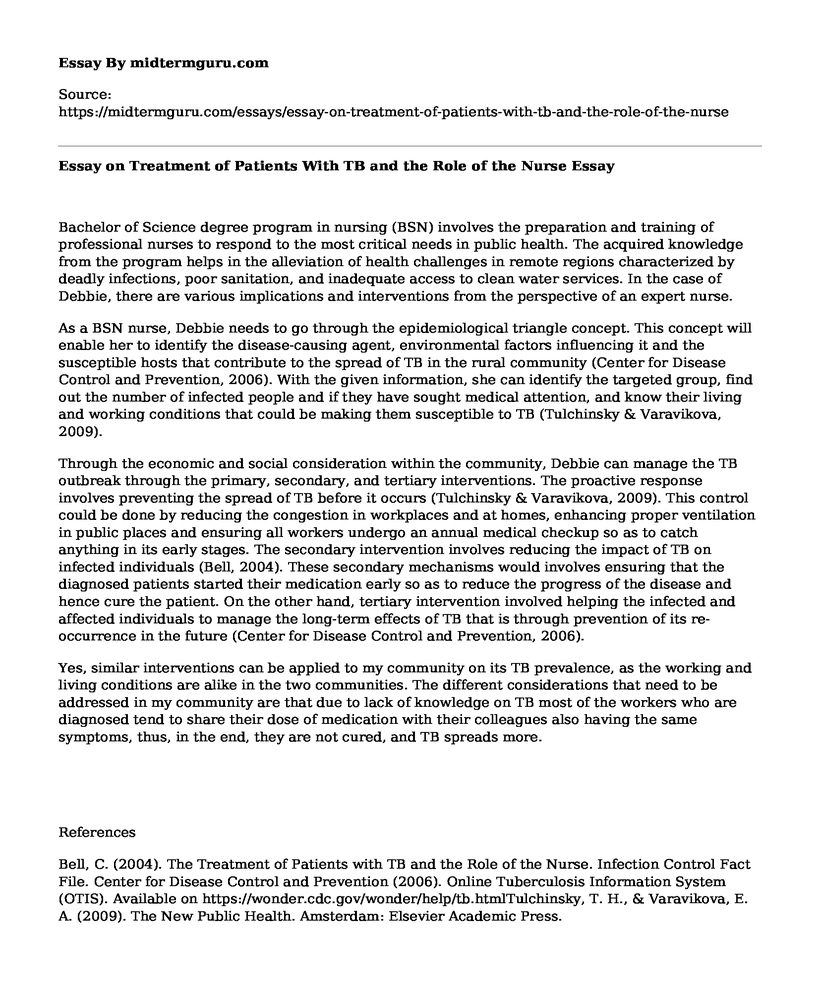Bachelor of Science degree program in nursing (BSN) involves the preparation and training of professional nurses to respond to the most critical needs in public health. The acquired knowledge from the program helps in the alleviation of health challenges in remote regions characterized by deadly infections, poor sanitation, and inadequate access to clean water services. In the case of Debbie, there are various implications and interventions from the perspective of an expert nurse.
As a BSN nurse, Debbie needs to go through the epidemiological triangle concept. This concept will enable her to identify the disease-causing agent, environmental factors influencing it and the susceptible hosts that contribute to the spread of TB in the rural community (Center for Disease Control and Prevention, 2006). With the given information, she can identify the targeted group, find out the number of infected people and if they have sought medical attention, and know their living and working conditions that could be making them susceptible to TB (Tulchinsky & Varavikova, 2009).
Through the economic and social consideration within the community, Debbie can manage the TB outbreak through the primary, secondary, and tertiary interventions. The proactive response involves preventing the spread of TB before it occurs (Tulchinsky & Varavikova, 2009). This control could be done by reducing the congestion in workplaces and at homes, enhancing proper ventilation in public places and ensuring all workers undergo an annual medical checkup so as to catch anything in its early stages. The secondary intervention involves reducing the impact of TB on infected individuals (Bell, 2004). These secondary mechanisms would involves ensuring that the diagnosed patients started their medication early so as to reduce the progress of the disease and hence cure the patient. On the other hand, tertiary intervention involved helping the infected and affected individuals to manage the long-term effects of TB that is through prevention of its re-occurrence in the future (Center for Disease Control and Prevention, 2006).
Yes, similar interventions can be applied to my community on its TB prevalence, as the working and living conditions are alike in the two communities. The different considerations that need to be addressed in my community are that due to lack of knowledge on TB most of the workers who are diagnosed tend to share their dose of medication with their colleagues also having the same symptoms, thus, in the end, they are not cured, and TB spreads more.
References
Bell, C. (2004). The Treatment of Patients with TB and the Role of the Nurse. Infection Control Fact File. Center for Disease Control and Prevention (2006). Online Tuberculosis Information System (OTIS). Available on https://wonder.cdc.gov/wonder/help/tb.htmlTulchinsky, T. H., & Varavikova, E. A. (2009). The New Public Health. Amsterdam: Elsevier Academic Press.
Cite this page
Essay on Treatment of Patients With TB and the Role of the Nurse. (2021, Jun 08). Retrieved from https://midtermguru.com/essays/essay-on-treatment-of-patients-with-tb-and-the-role-of-the-nurse
If you are the original author of this essay and no longer wish to have it published on the midtermguru.com website, please click below to request its removal:
- Health Information Technology and Electronic Medical Record
- Annotated Bibliography About Children With Autism
- Discussion Question on the Drug Administration Errors Article - Paper Example
- The Cardiovascular Disorder: Case Study
- Case Study on Khalid's Diet
- Hospitalization Risks: Patients at Risk of Clinical Errors & Unsafe Medication - Research Paper
- Strengths and Weaknesses of Professional Accountability in Nursing - Essay Sample







